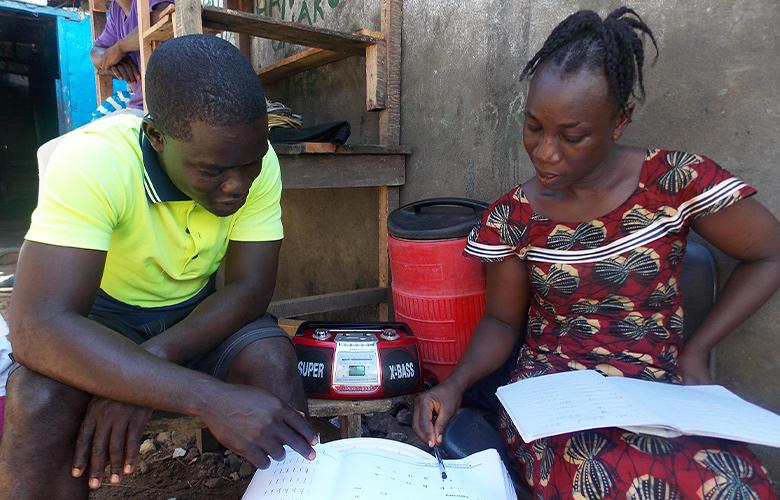
Today’s coronavirus pandemic (COVID-19) has parallels with West Africa’s Ebola outbreak six years ago. In both instances, the virus spread from isolated cases to thousands, resulting in quarantines and shutdowns of public gatherings and schools.
EDC is one of several organizations now partnering with the Liberian Ministry of Education to rapidly produce and broadcast educational radio programs for dissemination during the current COVID-19 school hiatus. I was in Liberia at the time of Ebola, working with the Advancing Youth Project (AYP), and I struggled with the same question confronting educators today: What can we do to continue educating students, while protecting everyone’s health and safety? Following are lessons I learned from that experience.
Leverage the communication channels and technologies that teachers and students already use.
In the United States, online resources are the go-to solution. In Liberia, almost everyone had access to a radio. EDC had created literacy and math interactive audio instruction programs for classrooms, and we broadcast those same lessons on local radio stations during the Ebola crisis. Because it wasn’t safe for students to meet in groups, we asked them to find a trusted, literate study partner to help with lessons at home.
Although mobile phones were widely used in Liberia, they couldn’t be effectively used as an educational platform. Students would have needed in-person training, and a crisis is a difficult time to train on new uses of technology. As radio was already integrated into Liberia’s education strategy, we could leverage it immediately during the crisis.
Offer learning resources that match the curriculum.
Besides AYP, there were other ongoing efforts to provide radio learning in Liberia. However, those efforts were ad hoc and did not follow Ministry-approved learning objectives. It is tempting for educators to gather and disseminate as many resources as possible, hoping that some of them will be useful. But the best course is to select resources that most closely support the country’s curriculum. Following an approved curriculum during program development ensures maximum usability of audio resources during crises such as Ebola and COVID-19.
Reach out and build trust with students, parents, and communities.
EDC staff offered youth literacy classes in some of the hardest hit areas. Although we couldn’t go into these communities during the Ebola crisis, we sent text messages with project updates to youth leaders and school principals. We also called to find out what was happening in communities. Maintaining contact reassured people that we weren’t abandoning them and that we were still there for them. When teacher training resumed, we added modules on providing psychosocial support to shell-shocked students. During a crisis, nurturing the relationships developed with school systems, teachers, and students is indispensable.
| Lisa Hartenberger Toby is an international development practitioner who has worked on formal and nonformal education projects in a variety of settings, including post-conflict and fragile countries. |

Add new comment